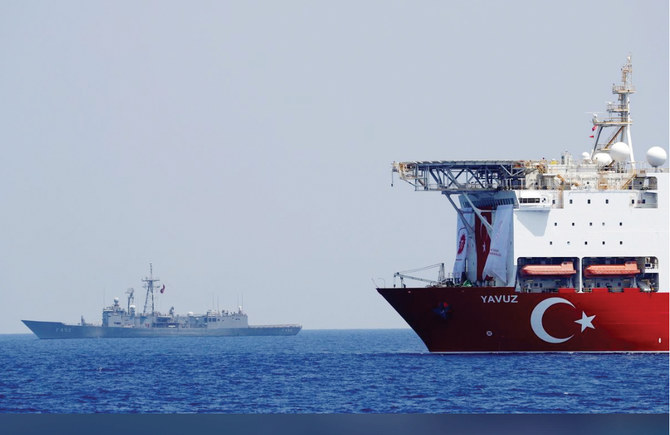ANKARA: A memorandum of understanding (MoU) signed between Turkey and Libya on Wednesday to demarcate maritime zones in the Eastern Mediterranean has sparked condemnation from Greece.
Athens sees the MoU as an attempt to block Greek and Cypriot energy drilling activities in the zone.
Turkey and Greece, although allies under the NATO umbrella, have long been at loggerheads over Cyprus and especially about the maritime zones they both claim as their own.
Hailing the MoU as a victory, Ankara claims that the move aims to “protect Turkey’s rights deriving from international law,” while Athens considers it a violation of the sovereign rights of third countries and of the good neighborliness principle. On Friday, the Greek Foreign Ministry summoned Turkish Ambassador Burak Ozugergin.
Ahmet Sozen, who chairs the department of international relations at the Eastern Mediterranean University in Nicosia, thinks Turkey is trying to get out of the isolation that it has been facing in the Eastern Mediterranean.
“Israel, Egypt, Greece and the Greek Cypriots have been forging bilateral and trilateral agreements keeping Turkey out of the equation for some time. Now, with the MoU with Libya, Turkey has been retaliating to this strategy,” he told Arab News.
Libya’s neighbor Egypt has been closely cooperating with Greece and Cyprus on energy resources in the Eastern Mediterranean, including a possible establishment of a regional gas market. Egyptian relations with Turkey have been especially frosty since 2013. Cairo condemned the deal as “illegal.”
The controversial move came just two weeks after the EU agreed on restrictive measures against Turkey in response to its drilling activities near the Cypriot coast in violation of the established maritime economic zone off the divided island.
Mona Sukkarieh, a political risk consultant and cofounder of Middle East Strategic Perspectives, said little regard is given to the presence of a number of Greek islands — especially Crete, located between the coasts of Turkey and Libya — along the corridor between Libyan and Turkish shores.
“This is not surprising because Turkey’s longstanding position is that islands’ capacity to generate maritime zones should be limited, compared with states with longer coastal fronts,” she told Arab News.
Turkey is among a handful of countries that did not ratify the UN Convention on the Law of the Sea. According to Sukkarieh, Ankara opposed the move “specifically because it opposes provisions governing the regime of islands.”
Last year, Wess Mitchell, US assistant secretary of state for European and Eurasian affairs, sent a message to Ankara over the drilling activities for hydrocarbons underway in Cyprus’s exclusive economic zone. He said that “Turkey’s view is a minority of one versus the rest of the world.”
Sukkarieh said: “The deal is significant for Turkey because Ankara was finally able to find a partner in the Eastern Mediterranean that shares its views on the demarcation of maritime areas. On paper, Turkey is no longer alone.”




























